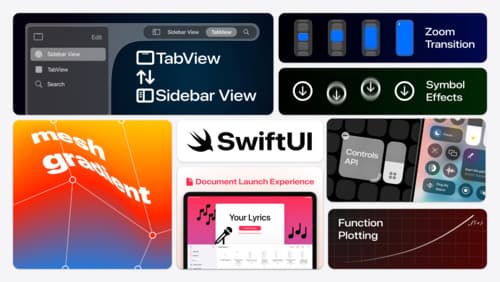swift tour
Asked on 2024-08-27
1 search
A Swift Tour: Explore Swift’s Features and Design
The session titled "A Swift Tour: Explore Swift’s features and design" at WWDC 2024 provides an overview of Swift, a modern programming language known for its performance and safety. The session is led by Alan Shortledge, who works on the Swift compiler. The tour covers the core features of Swift, aiming to familiarize attendees with the language and its unique design principles.
Key Highlights:
- Swift's Versatility: Swift is not only the premier language for writing apps on Apple's devices but also serves as a cross-platform systems language. It is suitable for server applications and can scale down to resource-constrained environments, such as smart home devices.
- Core Features: The session demonstrates Swift's features by building infrastructure for a social network, organized into a Swift package with three components: a data model library, an HTTP server, and a command-line utility.
- Value Types: The primary way to represent data in Swift is through value types, which are introduced early in the session.
For a detailed exploration of Swift's features, you can start with the A Swift Tour: Explore Swift’s features and design (01:05) session.
Session Chapter Markers:
- Introduction: 0
- Agenda: 51
- The example: 65
- Value types: 92
- Errors and optionals: 266
- Code organization: 587
- Classes: 718
- Protocols: 846
- Concurrency: 1113
- Extensibility: 1393
- Wrap up: 1615
This session is ideal for both newcomers to Swift and those who have been using it for a while, offering insights into how to leverage Swift's features effectively.

What’s new in SwiftUI
Learn how you can use SwiftUI to build great apps for any Apple platform. Explore a fresh new look and feel for tabs and documents on iPadOS. Improve your window management with new windowing APIs, and gain more control over immersive spaces and volumes in your visionOS apps. We’ll also take you through other exciting refinements that help you make expressive charts, customize and layout text, and so much more.

What’s new in SwiftData
SwiftData makes it easy to add persistence to your app with its expressive, declarative API. Learn about refinements to SwiftData, including compound uniqueness constraints, faster queries with #Index, queries in Xcode previews, and rich predicate expressions. Join us to explore how you can use all of these features to express richer models and improve performance in your app. To discover how to build a custom data store or use the history API in SwiftData, watch “Create a custom data store with SwiftData” and “Track model changes with SwiftData history”.

A Swift Tour: Explore Swift’s features and design
Learn the essential features and design philosophy of the Swift programming language. We’ll explore how to model data, handle errors, use protocols, write concurrent code, and more while building up a Swift package that has a library, an HTTP server, and a command line client. Whether you’re just beginning your Swift journey or have been with us from the start, this talk will help you get the most out of the language.
